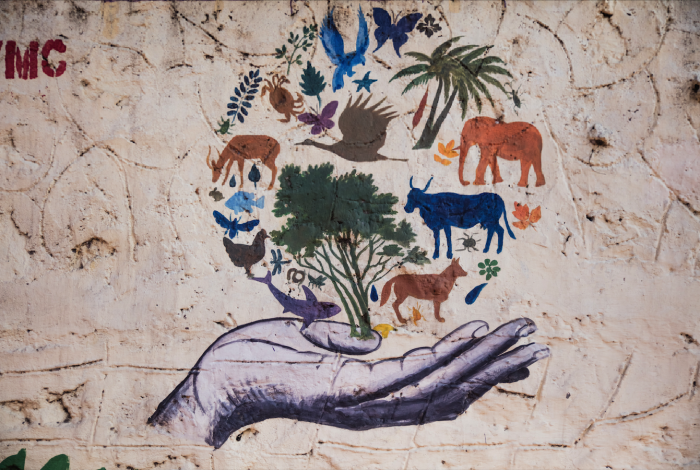I’m old enough to remember when “the news” was on twice.
It occurred in the evening at 5 or 6 p.m. and then at 10 or 11 p.m. on whichever of three channels you preferred: ABC, NBC, or CBS. If there was “breaking news,” everyone stopped what they were doing and watched. I remember the words well:
“We interrupt your regularly scheduled program to bring you…”
Children groaned, parents shushed, dinner stopped, bars and restaurants quieted. People looked to their TV sets, turned up the volume, and paused to listen.
Today? There is so much breaking news that nothing is actually breaking news. No doubt there is a lot going on. There always was. We just didn’t get it instantly as we do now.
Not “Breaking,” but Urgent…
Climate Change is not new news. Climatologists have studied perceived changes for over 200 years. But for the last 60 years, someone has been beating the drums about its direct impact on us. Louder and louder still, people like Rachel Carson, David Attenborough, Mutual of Omaha’s “Wild Kingdom,” Jacques Cousteau, Ralph Nader, Al Gore, Greta Thunberg, and so many more need us to listen.
We know what it’s about: plastic, air and water pollution, fossil fuels, to name a few.
We cry, “Industry is to blame!”
The industry claims, “Fossil fuels!”
Oil and gas screams, “Methane from cow farts!”
It’s nobody’s fault. You could research it ad infinitum, and it would become ad nauseam.
(Hint: it already has.)
But it’s everybody’s problem.
While we’re at it…
You know, since the last year (plus more) has been a complete sh*t show anyway, why not get busy and change your carbon footprint? Go all the way. But instead of trying to tackle the whole planet (even Atlas struggled to hold it up), take a good, hard look at your own universe and see what you can do differently.
It’s not hard.
Here are some ideas:
1. Go green clean.
Buy one or two cleaners for the whole house. Don’t buy something because it says it’s green (often they are not). Did you know you don’t need separate floor cleaner, furniture dusting cleaner, laundry soap, toilet cleaner, and window cleaner?
Learning how to use simple household items (like vinegar and baking soda) throughout your home will not only save you money but will also save your health. Not sure? Check the Environmental Working Group’s evaluations for household and personal products!
2. Clean smells like…nothing.
Lose the scented plug-ins and candles to cover up less-than-pleasant odors. These products are so toxic! Consider hiring a local green cleaning service for a thorough deep clean and stimulate their economy (this was a hard-hit industry last year). And open up your windows to allow free airflow for a few hours a day.
3. Paper towels should be used sparingly, if at all.
Buy a bag of cotton rags that can be laundered repeatedly.
4. Phase out plastics.
There are reusable shopping bags, produce bags, sandwich bags, bowl coverings, water bottles, and storage containers everywhere. Consider waxed paper or aluminum foil to wrap things in. The former is biodegradable, and foil can be recycled. Buy in bulk or glass or aluminum containers whenever possible.
5. Learn to cook.
If you didn’t take your culinary skills up a notch or two in the last year, it’s time to get busy. Why does learning to cook help climate change? Simply put, prepared food production often uses chemically treated food to increase flavor (mostly with salt and sugar) and preserve shelf life, not to mention the multiple layers of packaging. When people cook at home (from scratch), they tend to shop for fresh ingredients and seasonings. You can also lower your (COVID-19) weight, cholesterol, and blood pressure without even trying really. Win-win!
6. Donate unused items.
Someone else can use what you don’t want anymore. Don’t throw it away; give it away. Don’t be lazy. If you’re hanging onto something because you spent a lot of money on it, consider a consignment shop or having a yard sale. Reduce, reuse, recycle.
7. Be mindful.
Keep climate change front of mind in everything you do:
>> Run errands once or twice a week. Book other appointments like dentist, doctor, or hair cuts on those same days. Cut driving as much as possible.
>> Travel locally by car. We aren’t going to be able to fly abroad for some time, so…go see the United States! Camp or stay in cheap roadside hotels (they were hit hard by Covid too).
>> Support local non-chain restaurants. Prices range all over the map. Do what you can.
Each step does count!
Remember the election last year—how many people voted? It changed our political world completely! One little checkmark…
The trick is to stick with it. Create new habits, and don’t let yourself relapse.
Sure, it would be great if the oil and gas industry made some major changes (or if we could only get cows to quit farting), but those are the big boulders. Each smaller rock cleared from the boulder’s path first will make rolling it out of the way much easier.
Celebrate this Earth Month by doing everything in your power to keep our planet clean and safe for our future children.












Read 2 comments and reply